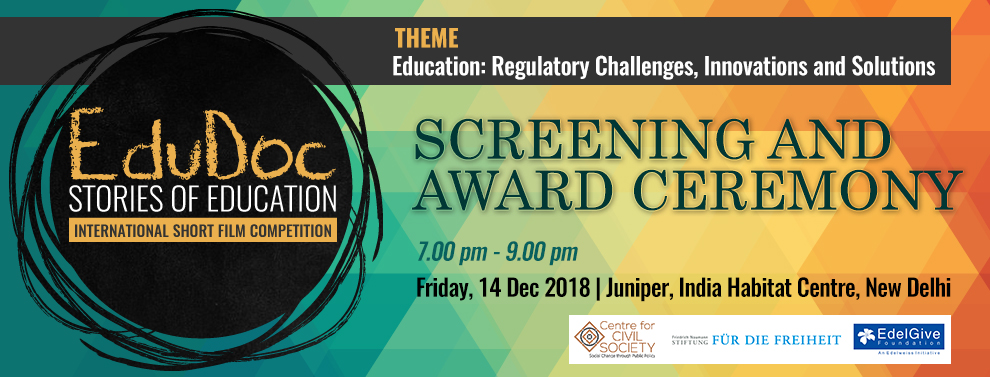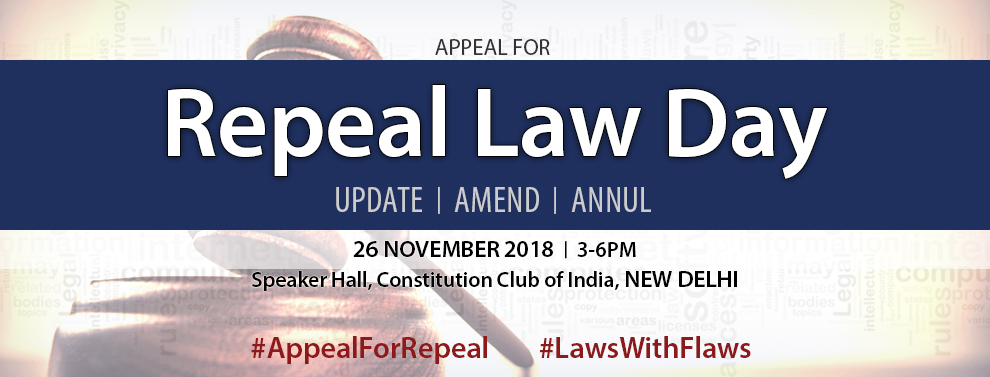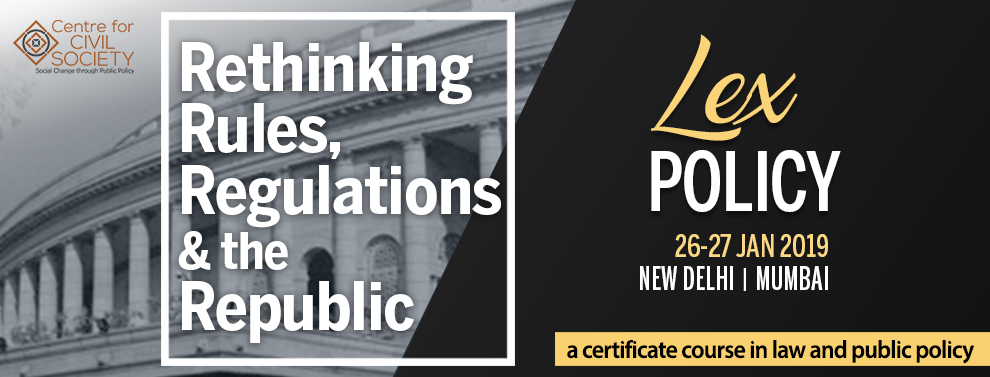You are here
Events
LEX POLICY - Rethinking Rules, Regulations and the Republic
Lex policy is a certificate course in law and public policy. The course will explore the various ways in which the constitution remains the fundamental determinant of government policy, and what implications it has had on India's policy success and failures.
About the Program
The Republic Day marks the day when the Constitution came into effect. Today, the Constitution is often used as an instrument for progressive change, or seen as an aspirational document of what the State should be. While it is both of them in limited capacities, it's fundamental role is to pose a set of constraints--to establish separation of powers, a system of checks and balances and to constrain the scope of legislation, among other things.
The document has been remarkable in ensuring peaceful transitions of power, protection of linguistic minorities, women's and dalits' rights and in constraining majoritarianism. At the same time, government policy has shaped its interpretation in such a way that it has failed to effectively constrain the State from intervening in citizens' lives. The Indian state's long conflict with individual liberties is manifest in constitutional cases like Champakam Dorairajan (1951), Golaknath (1967), Kesavananda Bharati(1973) and Justice K. S. Puttaswamy (Retd.) (2017). The Directive Principles of State Policy and Fundamental Rights raise some fundamental contradictions inherent in the Constitution.
These issues are not of mere academic interest. On the contrary, government intervention continues to weigh heavy on India's growth story. There are a 'million mutinies' across the country, on issues such as land rights, reservation in education and jobs, the unemployment crisis, religious freedom and others whose roots lie in an unrestrained state which acted as an arbiter of privilege for one section over the other.
On this Republic Day, join us as we attempt to understand the role of the constitution in India's history and the future that lies ahead. Seats are limited.
Speakers
Sanjiv Agarwal

Sanjiv Agarwal is an entrepreneur and inventor with patents issued in several countries. He authored 'The Indian Federalist - The Original Will of India's Founding Fathers'. In the past, He has challenged the 42nd and the 44th amendments, in the Supreme Court of India. These amendments inserted 'Socialist' in the preamble and removed the Right to Property from the fundamental rights, in the Indian Constitution. He is the founder of Good Governance India Foundation. He is inspired by Benjamin Franklin who famously said - 'If you would not be forgotten, as soon as you are dead and rotten, either write things worth reading, or do things worth the writing.'
Prashant Narang

An advocate who believes in free enterprise. Having taught at some of the best law schools across India as a visiting faculty, he is currently pursuing PhD from Center for the Study of Law and Governance at Jawaharlal Nehru University and running a YouTube channel on policy issues.
Bhuvana Anand

Bhuvana Anand is a governance and public policy specialist. Her experience spans working with donors and civil society organisations in Sudan, Afghanistan, Sri Lanka, India and the United States, in policy advocacy, managing multi-pronged programs and research. She has university and graduate level training in economics and politics, including coursework in political economy, public policy and principles of law. Bhuvana is deeply interested in institutional economics and public choice theories that help to explain the 'interest-incentive-information' motivation that guides and governs political leaders and civil servants. She received a Master of Arts in Law and Diplomacy from the Fletcher School at Tufts University and her bachelor's from St Xavier's College, Mumbai. She previously worked with the United Nations, the British Government's Department for International Development, and MIT's Poverty Action Lab. Bhuvana is currently a research advisor with CCS and was Principal Investigator for the volume Doing Business in Delhi.
Namita Wahi

Namita Wahi is a fellow at CPR, where she leads the Land Rights Initiative. Namita holds an SJD (doctoral) degree from Harvard Law School, where she wrote her dissertation on "The Right to Property and Economic Development in India". Namita's doctoral dissertation traces the historical evolution of the right to property in the Indian Constitution from the colonial period until 1967.
Namita's research interests are broadly in the areas of property rights, social and economic rights, and eminent domain or expropriation law. She has written extensively on these issues in various academic journals and edited volumes, as well as newspapers and magazines. Namita has taught courses in these areas at Harvard University, both at the Law School and the Department of Government, and at the National University of Juridical Sciences, Kolkata.
Before entering academia, Namita was a litigator with Davis Polk and Wardwell in New York, where she practised primarily in the areas of bankruptcy, securities, criminal defence and asylum law. Namita also holds an LLM from Harvard Law School, where she was awarded the Laylin Prize for the "Best Paper in International Law" and BA and LLB(Hons.) degrees from the National Law School of India University, Bangalore, where she received several gold medals for her academic achievements.
Harsh Gupta

Harsh Gupta is a Delhi-based investment professional. He has a degree in economics from Dartmouth College and an MBA from INSEAD. He is also a CFA charterholder and an IIT Delhi dropout. He has written on economics and politics for Mint, Swarajya, Pragati, Wall Street Journal, Indian Express and other publications. Harsh has co-authored a book on financial derivatives published by Cambridge University Press. He earlier worked for MIT Poverty Action Lab in India and Bain in the US and UK.
On this Republic Day, join us as we attempt to understand the role of the constitution in India's history and the future that lies ahead. Seats are limited.
Program Date: 26-27 January 2019
Application deadline: 24 January 2019
Venue: YWCA International Guest House, 10, Sansad Marg, Connaught Place
Course Fee: INR 2000
EduDoc: Stories of Education | 2018

| EduDoc 2018 | EduDoc Fellow 2018 | Awards 2018 | Entry Form | Entry Guidelines |
EduDoc 2018 – An International Short Film Competition
This year, EduDoc: Stories of Education, an annual International Short Film Competition organised by Centre for Civil Society (CCS), aims to highlight the regulatory challenges faced by the education sector throughout the world, through the audio-visual medium.
Theme Education: Regulatory Challenges, Innovations and Solutions
Objectives
- To identify and document the regulatory challenges of the education system through audio-visual medium
- To highlight various solutions devised by individuals, groups, communities, organizations, governments, to overcome these regulatory challenges
- To celebrate innovations and solutions in education
EduDoc Awards | 2018
- 5 best films will be screened at Schol Choice National Conference 2018
- Prize:
- Best Film: USD 500/ INR 40,000
- Second Best Film: USD 400/ INR 30,000
- Third Best Film: USD 150/ INR 10,000
- EduDoc Fellow Best Film: USD 150/ INR 10,000
Please note: Deductions will be applicable as per the government rule.
Stay Updated with us
- Use hashtag for Twitter: “#EduDoc18” within your tweet
“If you know someone who is redefining education, share their story with us in a short film.”
| EduDoc 2018 | EduDoc Fellow 2018 | Awards 2018 | Entry Form | Entry Guidelines |
Appeal for Repeal Laws Day 2018

Repeal of Laws:India, one of the largest democracies in the world with an ever-rising population, has had, several statutes that with the advent of time have become obsolete, redundant or repetitive. In addition to this, there is the matter of inconsistent language and dissemination- making it difficult for an ordinary citizen to access and comprehend the plethora of legal information with ease. This increased transaction cost coupled with glaring redundancy further breeds fertile grounds for corruption, discouraging engagement of individuals and firms with the society/ economy at large. Centre of Civil Society (CCS) initiated the 'Repeal of 100 Laws' Project in 2014 with the aim to identify laws that could be repealed on account of three reasons
For the 2018 edition of the Repeal of Laws initiative the following state compendiums have been prepared:
|
APPEAL FOR REPEAL LAW DAYCentre for Civil Society, in an effort to institutionalize the repealing of laws as a constitutional practice for the Republic of India, would like to bring together like-minded organizations, scholars, academicians and lawyers to acknowledge 26 November as the Appeal for Repeal Law Day. Its objectives are:
The target is to bring together 70-80 dedicated individuals under one roof and to engage in constructive dialogue around the potential processes required for the institutionalization of the repeal of laws. The idea is to deliberate over the existing structures and processes for repealing laws in India, and envisaging practices which can be adopted moving forward. |
Baithak : Conversations in Policy
Following the success of previous Baithaks with Gurcharan Das and Nikhil Pahwa in August and September respectively, CCS and FNF have invited Laveesh Bhandari to participate and moderate the forthcoming Baithak: Conversations in Policy. Laveesh is an economist, an author, a columnist and an entrepreneur. He has undertaken various projects in industrial and economic reforms in India in addition to government advisory roles on policy and measurement issues in the environment. He is currently the Director of Indicus Foundation and also founded Indicus Analytics. The discussion will explore the intersection of ethics, environment and economics.
Baithak: Conversations in Policy is CCS Academy's initiative for fostering continued learning and development of CCS and FNF graduates through open group discussions in an informal group setting.
The idea of Baithak is to give a platform to all CCS and FNF graduates to come together for a discussion on contemporary socio-cultural and economic issues. Its objective is to create a knowledge ecosystem, impacting the policy space in India at large.
Its objective is to create a knowledge ecosystem, impacting the policy space in India at large.
Date : November 3rd, 2018
Time : 4 p.m. – 6 p.m.
Venue : Centre for Civil Society, A-69, Haus Khas, New Delhi
For details contact:
Shivang Raina (shivang@ccs.in)
Baithak : Conversations in Policy
Baithak: Conversations in Policy is CCS Academy’s new initiative for fostering continued learning and development of CCS and FNF graduates through open group discussions in an informal group setting and in the presence of prominent voices from the liberal movement in India.
Following the success of the first Baithak, CCS and FNF have invited Nikhil Pahwa to participate in and moderate the second Baithak. Nikhil co-founded Savetheinternet.in campaign (now the Internet Freedom Foundation) for Net Neutrality in India. He is a journalist, an entrepreneur, an activist and a TED fellow who is also the founder and editor at MediaNama.
Nikhil is currently a part of an initiative to fix Aadhaar in addition to other initiatives geared towards tech policy.
The discussion will be centered around digital rights and freedom of expression where Nikhil will draw upon his experiences in online media advocacy and movement building. In addition, other topics such as net neutrality and data protection will be explored.
About: Centre for Civil Society along with Friedrich Naumann Foundation is organizing the forthcoming ‘Baithak: Conversations in Policy’ on the 29th of September from 4 – 6 p.m. at A-69, Haus Khas, New Delhi. If you have been associated with CCS or FNF in the past and have attended any of their programs, this is the platform for you to come together in a more informal setting for a discussion on contemporary socio-cultural and economic issues.
For details contact:
Shivang Raina (shivang@ccs.in)








